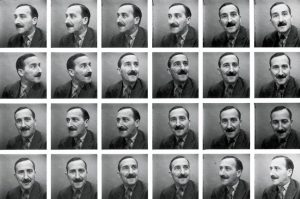Leo Carey in The New Yorker:
 On February 22, 1942, the Austrian writer Stefan Zweig and his second wife went to the bedroom of a rented house in Petrópolis, Brazil. They lay down—she in a kimono, he in a shirt and tie—after taking an enormous dose of barbiturates. When news of their suicides broke, it was reported as a matter of worldwide significance. The New York Times carried the news on its front page, alongside reports of the rout of Japanese forces in Bali and of a broadcast address by President Roosevelt. An editorial the next day, titled “One of the Dispossessed,” saw in Zweig’s final act “the problems of the exile for conscience sake.” Zweig, a Jew, had left Austria in 1934, living in England and New York before the final move to Brazil, and his work had been banned and vilified across the German-speaking world. In his suicide note, he spoke of “my own language having disappeared from me and my spiritual home, Europe, having destroyed itself.” He concluded, “I salute all my friends! May it be granted them yet to see the dawn after the long night! I, all too impatient, go on before.”
On February 22, 1942, the Austrian writer Stefan Zweig and his second wife went to the bedroom of a rented house in Petrópolis, Brazil. They lay down—she in a kimono, he in a shirt and tie—after taking an enormous dose of barbiturates. When news of their suicides broke, it was reported as a matter of worldwide significance. The New York Times carried the news on its front page, alongside reports of the rout of Japanese forces in Bali and of a broadcast address by President Roosevelt. An editorial the next day, titled “One of the Dispossessed,” saw in Zweig’s final act “the problems of the exile for conscience sake.” Zweig, a Jew, had left Austria in 1934, living in England and New York before the final move to Brazil, and his work had been banned and vilified across the German-speaking world. In his suicide note, he spoke of “my own language having disappeared from me and my spiritual home, Europe, having destroyed itself.” He concluded, “I salute all my friends! May it be granted them yet to see the dawn after the long night! I, all too impatient, go on before.”
Zweig’s death arguably marked the high point of his literary standing: to most English-speaking readers, he is now little more than a name. Yet, for a time, in the nineteen-twenties and thirties, he was the most translated writer in Europe. Along with the fiction and the biographies on which his reputation chiefly rests, he produced a seemingly effortless stream of plays, translations, poems, travelogues, and essays—on subjects ranging from manuscripts to Moscow theatre. An energetic literary spokesman and pen member, he lectured, in several languages, around the world. He also championed many other writers, helping them financially and with glowing appraisals of their work.
Beside contemporaries like Thomas Mann and Joseph Roth, Zweig can seem like an also-ran; he left no single, defining masterwork. But, in the past few years, it’s become possible to appreciate anew the variety and ambition of his writing. New York Review Books and Pushkin Press have reissued most of Zweig’s important fiction, often in fine new translations by Anthea Bell, and a number of his biographical studies. They have also published translations—the first ever—of an abandoned novel, “The Post-Office Girl,” and of a long-lost novella, “Journey into the Past.”
More here. (Note: From August 2012 issue. Recommend his gorgeous book, Beware of Pity)
